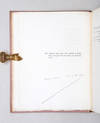

Stock Photo: Cover May Be Different
How We Got Here; The 70s: The Decade That Brought You Modern Life (For Better Or Worse)
by Frum, David
- Used
- good
- Hardcover
- first
- Condition
- Good/Very good
- ISBN 10
- 0465041957
- ISBN 13
- 9780465041954
- Seller
-
Silver Spring, Maryland, United States
Item Price
$45.00$33.75
Payment Methods Accepted
About This Item
New York: Basic Books, 2000. First Edition [Stated], First Printing [Stated]. Hardcover. Good/Very good. Danielle Crittenden (Author photograph). xxiv, 418, [2] pages. Illustrations. Notes. Index. Some spine weakness at title page noted, restrengthened with glue. For many, the 1970s evoke the Brady Bunch and the birth of disco. In this first, thematic popular history of the decade, David Frum argues that it was the 1970s, not the 1960s, that created modern America and altered the American personality forever. A society that had valued faith, self-reliance, self-sacrifice, and family loyalty evolved in little more than a decade into one characterized by superstition, self-interest, narcissism, and guilt. Frum examines this metamorphosis through the rise to cultural dominance of faddish psychology, astrology, drugs, religious cults, and consumer debt, and profiles such prominent players of the decade as Werner Erhard, Alex Comfort, and Jerry Brown. How We Got Here is lively and provocative reading. David Jeffrey Frum (born June 1960) is a Canadian-American political commentator and a former speechwriter for President George W. Bush, who is currently a senior editor at The Atlantic as well as an MSNBC contributor. In 2003, Frum authored the first book about Bush's presidency written by a former member of the administration. He has taken credit for the famous phrase "axis of evil" in Bush's 2002 State of the Union address. Frum formerly served on the board of directors of the British think tank Policy Exchange, the anti-drug policy group Smart Approaches to Marijuana, and as vice chairman and an associate fellow of the R Street Institute. Derived from a Kirkus review: Fun and factual popular history tracing our present-day culture to its roots in the 1970s. The 1970s? Absolutely, according to conservative analyst Frum, who here considers how very radical we Americans have become. Despite all the marches, assassinations, drugs, and music of the 1960s, Frum maintains that the '70s were more formative. A gas crisis, a crack epidemic, an economic slump, and disco aren't as sexy as hippies in the mud, but Frum persuasively demonstrates that our watershed years coincided with the Watergate era, when we retooled Detroit, launched the Information Age, and, true to the backlash reflected in the 1974 movie Death Wish, incarcerated criminals instead of blaming society. Frum crowns actor Alan Alda the "70s prototype of the newly sensitive man, echoing the tremulous emotion heard in crooners like James Taylor. He calls this vast 'shift in emotional climate a kind of global moistening'; it allowed even male politicians to weep, another effect of the women's movement. The joy of sex seems to have been discovered in 1972: 'Feminists like Germaine Greer championed promiscuity as a means to break women's `doglike' devotion to men, and the young women of the 1970s listened and obeyed.' Virginity went out of style, even as women suddenly became police officers or bus drivers. All this put millions in day care, and divorce skyrocketed. Food turned global and had to be nutritious, a concern for health also demonstrated in new protective sports gear. Looking out for number one financially initiated our era's greed. The increase in stock investing, intensified with the Internet, began in the `70s. Today's politically correct minority visibility first emerged in the '70s. In short, it's hard to spot a topic not covered here. A thoroughly enjoyable time capsule for the turn of the century.
Reviews
(Log in or Create an Account first!)
Details
- Bookseller
- Ground Zero Books
(US)
- Bookseller's Inventory #
- 86373
- Title
- How We Got Here; The 70s: The Decade That Brought You Modern Life (For Better Or Worse)
- Author
- Frum, David
- Illustrator
- Danielle Crittenden (Author photograph)
- Format/Binding
- Hardcover
- Book Condition
- Used - Good
- Jacket Condition
- Very good
- Quantity Available
- 1
- Edition
- First Edition [Stated], First Printing [Stated]
- ISBN 10
- 0465041957
- ISBN 13
- 9780465041954
- Publisher
- Basic Books
- Place of Publication
- New York
- Date Published
- 2000
- Keywords
- Work Ethic, Divorce, POSSLQ, Granola, Full Faith and Credit, Abortion, Promiscuity, Harvard, Working-Class, Hayek, Poverty, Republican, Americanism, Homosexuals, Immigration, Inflation, Energy Crisis, Progressivism, Sexuality, Sexual Freedom, Terrori
Terms of Sale
Ground Zero Books
Books are offered subject to prior sale. Satisfaction guaranteed. If you notify us within 7 days that you are not satisfied with your purchase, we will refund your purchase price when you return the item in the condition in which it was sold.
About the Seller
Ground Zero Books
Biblio member since 2005
Silver Spring, Maryland
About Ground Zero Books
Founded and operated by trained historians, Ground Zero Books, Ltd., has for over 30 years served scholars, collectors, universities, and all who are interested in military and political history.
Much of our diverse stock is not yet listed on line. If you can't locate the book or other item that you want, please contact us. We may well have it in stock. We welcome your want lists, and encourage you to send them to us.
Much of our diverse stock is not yet listed on line. If you can't locate the book or other item that you want, please contact us. We may well have it in stock. We welcome your want lists, and encourage you to send them to us.
Glossary
Some terminology that may be used in this description includes:
- First Edition
- In book collecting, the first edition is the earliest published form of a book. A book may have more than one first edition in...
- Title Page
- A page at the front of a book which may contain the title of the book, any subtitles, the authors, contributors, editors, the...
- Spine
- The outer portion of a book which covers the actual binding. The spine usually faces outward when a book is placed on a shelf....

